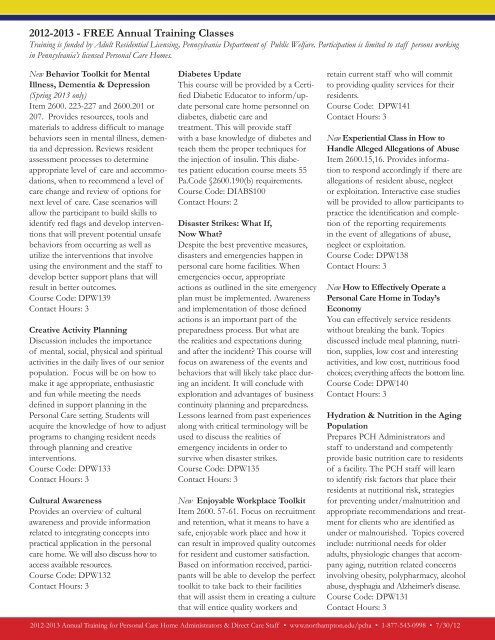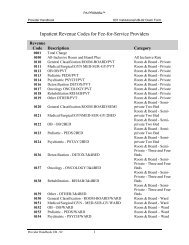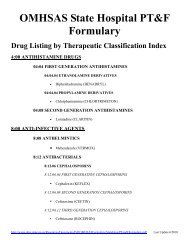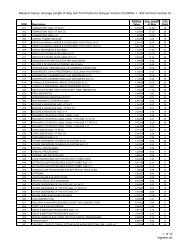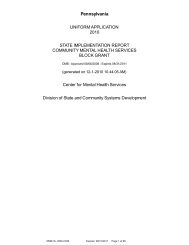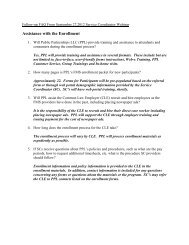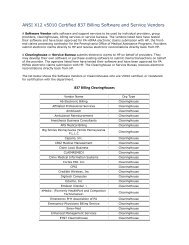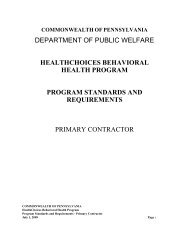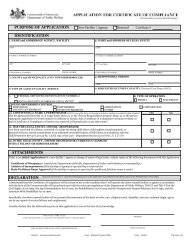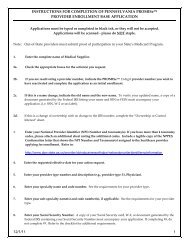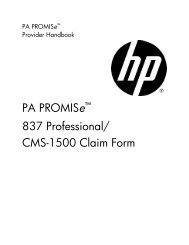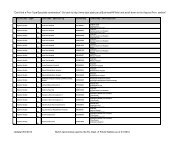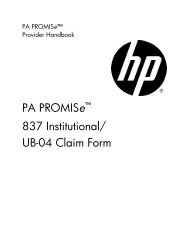Free Annual Training for Personal Care Home Administrators ...
Free Annual Training for Personal Care Home Administrators ...
Free Annual Training for Personal Care Home Administrators ...
Create successful ePaper yourself
Turn your PDF publications into a flip-book with our unique Google optimized e-Paper software.
2012-2013 - FREE <strong>Annual</strong> <strong>Training</strong> Classes<br />
<strong>Training</strong> is funded by Adult Residential Licensing, Pennsylvania Department of Public Welfare. Participation is limited to staff persons working<br />
in Pennsylvania’s licensed <strong>Personal</strong> <strong>Care</strong> <strong>Home</strong>s.<br />
New Behavior Toolkit <strong>for</strong> Mental<br />
Illness, Dementia & Depression<br />
(Spring 2013 only)<br />
Item 2600. 223-227 and 2600.201 or<br />
207. Provides resources, tools and<br />
materials to address difficult to manage<br />
behaviors seen in mental illness, dementia<br />
and depression. Reviews resident<br />
assessment processes to determine<br />
appropriate level of care and accommodations,<br />
when to recommend a level of<br />
care change and review of options <strong>for</strong><br />
next level of care. Case scenarios will<br />
allow the participant to build skills to<br />
identify red flags and develop interventions<br />
that will prevent potential unsafe<br />
behaviors from occurring as well as<br />
utilize the interventions that involve<br />
using the environment and the staff to<br />
develop better support plans that will<br />
result in better outcomes.<br />
Course Code: DPW139<br />
Contact Hours: 3<br />
Creative Activity Planning<br />
Discussion includes the importance<br />
of mental, social, physical and spiritual<br />
activities in the daily lives of our senior<br />
population. Focus will be on how to<br />
make it age appropriate, enthusiastic<br />
and fun while meeting the needs<br />
defined in support planning in the<br />
<strong>Personal</strong> <strong>Care</strong> setting. Students will<br />
acquire the knowledge of how to adjust<br />
programs to changing resident needs<br />
through planning and creative<br />
interventions.<br />
Course Code: DPW133<br />
Contact Hours: 3<br />
Cultural Awareness<br />
Provides an overview of cultural<br />
awareness and provide in<strong>for</strong>mation<br />
related to integrating concepts into<br />
practical application in the personal<br />
care home. We will also discuss how to<br />
access available resources.<br />
Course Code: DPW132<br />
Contact Hours: 3<br />
Diabetes Update<br />
This course will be provided by a Certified<br />
Diabetic Educator to in<strong>for</strong>m/update<br />
personal care home personnel on<br />
diabetes, diabetic care and<br />
treatment. This will provide staff<br />
with a base knowledge of diabetes and<br />
teach them the proper techniques <strong>for</strong><br />
the injection of insulin. This diabetes<br />
patient education course meets 55<br />
Pa.Code §2600.190(b) requirements.<br />
Course Code: DIABS100<br />
Contact Hours: 2<br />
Disaster Strikes: What If,<br />
Now What?<br />
Despite the best preventive measures,<br />
disasters and emergencies happen in<br />
personal care home facilities. When<br />
emergencies occur, appropriate<br />
actions as outlined in the site emergency<br />
plan must be implemented. Awareness<br />
and implementation of those defined<br />
actions is an important part of the<br />
preparedness process. But what are<br />
the realities and expectations during<br />
and after the incident? This course will<br />
focus on awareness of the events and<br />
behaviors that will likely take place during<br />
an incident. It will conclude with<br />
exploration and advantages of business<br />
continuity planning and preparedness.<br />
Lessons learned from past experiences<br />
along with critical terminology will be<br />
used to discuss the realities of<br />
emergency incidents in order to<br />
survive when disaster strikes.<br />
Course Code: DPW135<br />
Contact Hours: 3<br />
New Enjoyable Workplace Toolkit<br />
Item 2600. 57-61. Focus on recruitment<br />
and retention, what it means to have a<br />
safe, enjoyable work place and how it<br />
can result in improved quality outcomes<br />
<strong>for</strong> resident and customer satisfaction.<br />
Based on in<strong>for</strong>mation received, participants<br />
will be able to develop the perfect<br />
toolkit to take back to their facilities<br />
that will assist them in creating a culture<br />
that will entice quality workers and<br />
retain current staff who will commit<br />
to providing quality services <strong>for</strong> their<br />
residents.<br />
Course Code: DPW141<br />
Contact Hours: 3<br />
New Experiential Class in How to<br />
Handle Alleged Allegations of Abuse<br />
Item 2600.15,16. Provides in<strong>for</strong>mation<br />
to respond accordingly if there are<br />
allegations of resident abuse, neglect<br />
or exploitation. Interactive case studies<br />
will be provided to allow participants to<br />
practice the identification and completion<br />
of the reporting requirements<br />
in the event of allegations of abuse,<br />
neglect or exploitation.<br />
Course Code: DPW138<br />
Contact Hours: 3<br />
New How to Effectively Operate a<br />
<strong>Personal</strong> <strong>Care</strong> <strong>Home</strong> in Today’s<br />
Economy<br />
You can effectively service residents<br />
without breaking the bank. Topics<br />
discussed include meal planning, nutrition,<br />
supplies, low cost and interesting<br />
activities, and low cost, nutritious food<br />
choices; everything affects the bottom line.<br />
Course Code: DPW140<br />
Contact Hours: 3<br />
Hydration & Nutrition in the Aging<br />
Population<br />
Prepares PCH <strong>Administrators</strong> and<br />
staff to understand and competently<br />
provide basic nutrition care to residents<br />
of a facility. The PCH staff will learn<br />
to identify risk factors that place their<br />
residents at nutritional risk, strategies<br />
<strong>for</strong> preventing under/malnutrition and<br />
appropriate recommendations and treatment<br />
<strong>for</strong> clients who are identified as<br />
under or malnourished. Topics covered<br />
include: nutritional needs <strong>for</strong> older<br />
adults, physiologic changes that accompany<br />
aging, nutrition related concerns<br />
involving obesity, polypharmacy, alcohol<br />
abuse, dysphagia and Alzheimer’s disease.<br />
Course Code: DPW131<br />
Contact Hours: 3<br />
2012-2013 <strong>Annual</strong> <strong>Training</strong> <strong>for</strong> <strong>Personal</strong> <strong>Care</strong> <strong>Home</strong> <strong>Administrators</strong> & Direct <strong>Care</strong> Staff • www.northampton.edu/pcha • 1-877-543-0998 • 7/30/12


